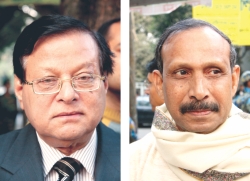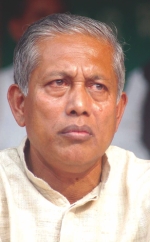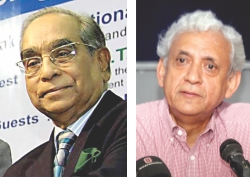Politics
Not "By the People"
The Awami League-government has scrapped the provision of a Caretaker
Government on the pretext that unelected persons cannot rule the country,
but the presence of three unelected Ministers and seven
Advisers in the government makes a mockery of that stance
Shakhawat Liton
What's the all-powerful argument that Prime Minister Sheikh Hasina, her cabinet colleagues and also party leaders have been making since last June in defence of abolishing the caretaker government (CG) system? – They say that CG consisted of unelected persons, and the constitution in no way allows unelected people to rule the country.
 |
Shafique Ahmed |
Yafez Osman |
Citing the May 10 Supreme Court verdict that declared the CG system illegal, the ruling party leaders are also claiming that the government scrapped the CG to honour the apex court's order.
In the verdict, the apex court upheld the rule of elected persons in light of the spirit of the constitution. One crucial question is: did the government genuinely honour the spirit of the apex court's verdict?
In line with the cabinet's decision, Law, Justice and Parliamentary Affairs Minister Shafique Ahmed on June 25 placed a bill in the parliament to bring some changes in the constitution including the crucial one for scrapping the CG system. He proposed for passage of the bill, and the House passed it completing some procedures.
One of the most interesting aspects in the process was that the man who piloted the bill in the parliament is himself an unelected person. He is the parliamentary affairs minister, but he is not a member of parliament. Parliament does not own him and does not provide him with protections that an MP enjoys while speaking on the floor. It is an unprecedented record in the history of our parliament that the man who is holding the portfolio of law justice and parliamentary affairs ministry is not a member of the parliament.
However, Shafique is not alone; there are two more unelected members in the council of ministers--Industries Minister Dilip Barua and State Minister for Science and ICT Yeafesh Osman.
Are they, then, holding the portfolios unconstitutionally? How were they inducted in the cabinet despite the fact that they were not elected?
 |
Dilip Barua |
On advice of PM Hasina, the president appointed them. They took oath and entered their offices according to the constitutional provision. Does this mean the constitution allows unelected people to govern the country? No. But it has an exceptional provision which was introduced with honest intention. But over the years, it has been distorted and put against the basic spirit of the constitution on the rule of representative elected by people.
The constitution of 1972 introduced the provision, conditionally allowing the appointment of an individual as a member of the council of ministers who is not an MP. The condition was that s/he must be elected as an MP within the next six months of his/her appointment. Failure to do so would mean, s/he would cease to be a member of the council of ministers. This provision was made in light of the article 11 of the constitution that upholds the rule of representative elected by people. The framers of the constitution introduced the provision to meet the urgency by keeping the window open for a government to induct people with expertise in special areas.
But the constitution's fourth amendment in 1975 destroyed the basic scheme of the constitution by deleting the phrase "and in which effective participation by the people through their elected representatives in administration at all levels shall be ensured” from the article 11.
The infamous and vile amendment that had introduced the one party rule in the country also brought significant changes regarding to the provision on appointment of non-elected people as members of the council of ministers.
Introducing the presidential form of the government, this amendment empowered the president with absolute authority to appoint anybody as the prime minister or minister whether s/he was a MP. And the condition imposed on non-elected people to be elected within six months was deleted.
It's ironic that military ruler Ziaur Rahman, amending the constitution through martial law proclamations in 1978, had limited the president's discretionary power to appoint ministers. The changes made it mandatory for appointing a prime minister from MPs who will command support of the majority. Regarding appointment of ministers, the changes had said not more than one-fifth of their members of the council of ministers shall be chosen from among persons qualified for election as MPs.
 |
H T Imam |
Gowhar Rizvi |
The constitution's twelfth amendment in 1991, through which the country switched over to the parliamentary form of the government, also brought changes to this provision on the technocrat ministers. The changes say that not less than nine-tenths of their number shall be appointed from among members of parliament and not more than one-tenth of their number may be chosen from among persons qualified for election as MPs.
None of the previous changes restored to the original provision of 1972 constitution. Therefore, if a person, who is not an MP, is once appointed as a member of the council of ministers can continue holding office till the last day of the government's tenure or till the day the Prime Minister asks him/her to resign.
However the issue has been raised during the last constitutional amendment. Members of the parliamentary special committee formed to prepare proposals for amendments spoke for restoration of the original provision on technocrat ministers. But the committee failed to come with a recommendation to do so.
Later, while scrutinising the constitution bill at the end of June, the parliamentary standing committee on the law justice and parliamentary affairs ministry had discussed the loopholes in the existing system that allow non-elected people to remain in the cabinet for an indefinite period.
Talking to some members of the committee at that time it was learnt that they, at a meeting on June 27, discussed the restoration of the original constitutional provision on technocrat ministers to shut the door for un-elected people to stay in the cabinet for an indefinite period.
“Apparently, there is a conflict with article 11 of the constitution. And the ultimate solution is to restore the original provision of the 1972 constitution,” Suranjit Sengupta told this correspondent on June 28 at his office.
Before finalising its report, the committee consulted with PM Hasina and finally placed its report in parliament on June 29 recommending for passage of the bill without saying anything on the technocrat ministers.
And on June 30 the parliament passed the bill abolishing the CG system, keeping the window open for non-elected people to continue staying in the cabinet for an indefinite period as they did in past.
Not only that, the government in January 2009 amended its rules of business, empowering PM Hasina to appoint as her advisers and special assistants as many persons as she deemed necessary.
The amendments authorised the premier to determine the terms and conditions of the appointments as she deems expedient for public interest, and also allow her to let any of the advisers or special assistants attend meetings of the cabinet or any other government committee.
In an exercise of authority, Hasina has appointed to herself seven advisers with the ranks and status of full-fledged ministers and allocated portfolios for them.
Their presence at the cabinet meetings drew huge critcism on constitutional grounds as they did not take oath. The then AL general secretary Abdul Jalil on June 25 of 2009 in parliament termed their presence of advisers at the cabinet meetings "unconstitutional".
“The advisers can't sit at the cabinet meetings; lots of secrets are discussed there; ministers took oath of secrecy but they did not do so as per the constitution,” said Jalil.
However, criticism could not prevent the PM's advisers from attending the cabinet meetings as the premier wants them to do so.
Technocrat ministers and PM's advisers are holding their portfolios, mocking the AL-led government's strong stance against unelected people's rule. And we have the answer to the crucial question: did the government genuinely honour the spirit of the Supreme Court verdict that declared the CG illegal?
The writer is Senior Reporter, The Daily Star.